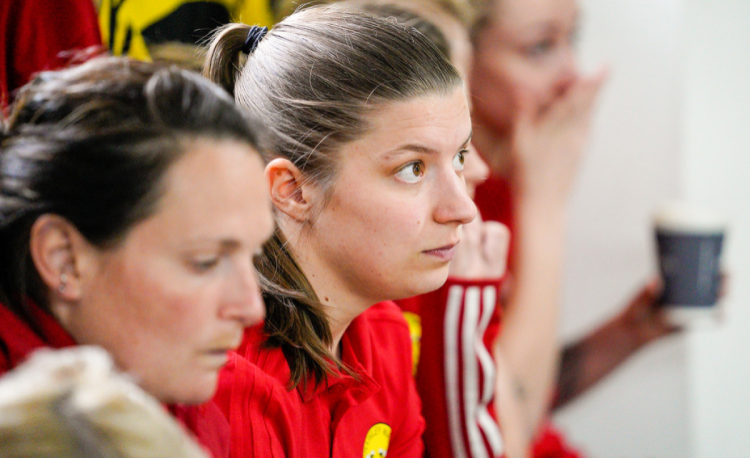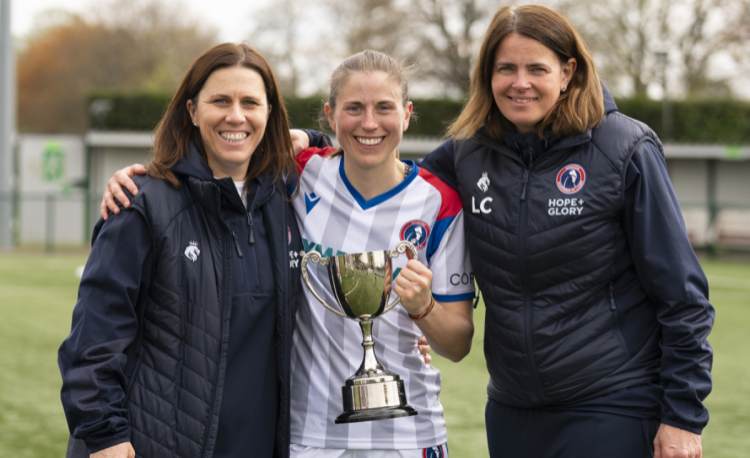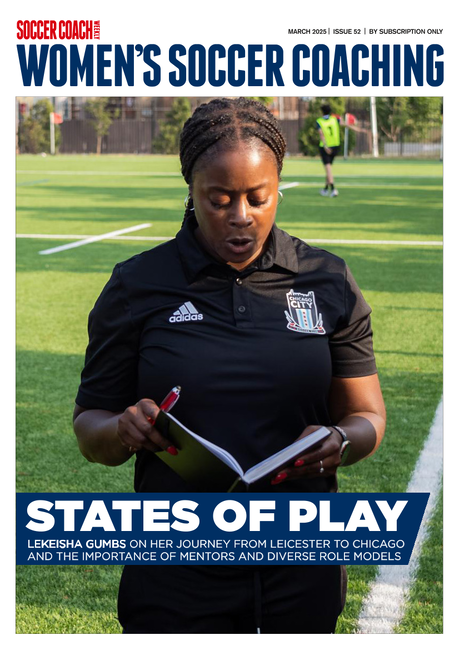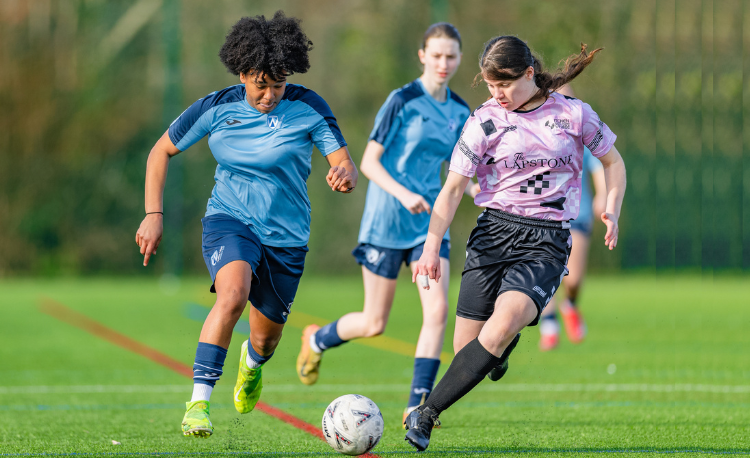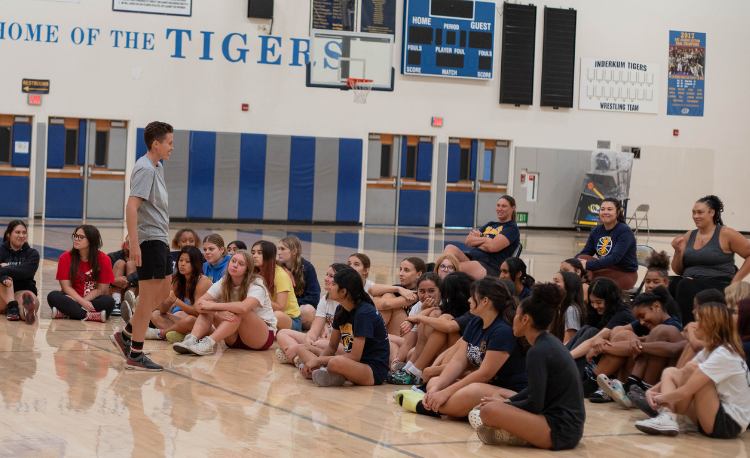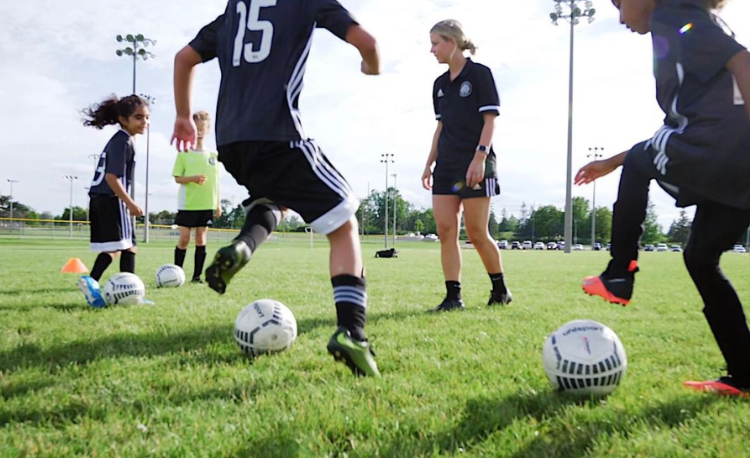You are viewing
1 of your 3 free articles
Breaking the tension before a crucial game
We all know some matches are bigger than others. But, as Lucy Bailey notes, it is important to keep your players calm and not change your own behaviour.
Big games are always tense for everyone involved – but, as coaches, it is our responsibility to put our own emotions aside and keep our players calm and level-headed, to give them the best chance of success.
It is likely that the match is all we have thought about all week – contemplating the most effective starting line-up, who to substitute and when, what formation would be best.
But my advice, based on experience, is: Pause and take a breath.
My U13s girls grassroots team had a League Cup semi-final a few weeks ago. Our league season had been a bit up-and-down, with it being our first year of 11-a-side, but we had had much more success in cup games.
However, preparation for this match wasn’t ideal as our usual goalkeeper (and captain) got an injury in the week leading up to the match that would sideline her for two to four weeks.
We knew the weather wouldn’t be on our side, and, lo and behold, the pitch was in very poor condition on the day of the match.
We also knew our opposition would be strong, having previously played them in the league.
At times like this, when lots of external circumstances seem to be going against you, I believe it’s even more important to know what your values are as a coach. Let those values be your lifejacket.
Training approach
Preparations for a big match will start with training.
Make sure your training session is planned in advance and that you know what coaching points you want to draw out. Perhaps also determine which individuals you are going to give some extra guidance to.
If it’s a cup game, it might be worth dedicating a bit of time at the end of the session to practising a penalty shoot-out, including the solo walk up to the spot.
Few players feel comfortable taking them, so it is best to practise first when they are in a safe environment to fail.
You could even scatter penalty training throughout your season so that it is not specifically associated with preparation for a big cup match.
Pre-match activities
Tag, or any variation of it, is a great arrival activity to get your players into a good mood on a big matchday.
They immediately forget about the match ahead of them, relax and focus on laughing with their team-mates.
Of course, it also gets the body nice and warm and allows players to practise all of the evasive movements they are going to need during the game.
Mind your language!
We tend to hype up ‘big games’ more than any other – but to the players in front of us, every match holds a similar importance.
You should avoid using any different language or tone that might provoke anxiety in your players, such as insisting on winning the game, or playing in a certain way.
Unless you normally talk to your players like this, and they expect it from you, suddenly demanding a win or a playing style, when you never normally would, can feel out of character to your players.
Just before kick-off in our semi-final, I spoke to our players about playing without fear.
I reframed the game by saying it was an opportunity for them to take part in an extra match that few other teams are getting the chance to play – so what’s the point in playing with fear when it will just stop you from playing at your best?
I encouraged them to play with freedom and enjoy the occasion.
I also helped them to visualise parts of the match, like making an important save or tackle or scoring a goal from a particular area of the pitch. This helped to focus their minds on what they could bring to the game as individuals.
It’s important that your matchday behaviours do not change just because the significance of the match has changed – especially when you are coaching younger players.
Try using a matchday target that links into your training topic as a way to measure success without looking at the final result.
For example, my training topic was ‘stopping the cross’ – so our matchday target was to try and stop the opposition from exceeding a set number of crosses. This number can be set by the players.
Substitutes can be challenged with keeping a tally to keep them focused on the match.
"Avoid any different language or tone that might provoke anxiety in your players..."
During the match
Similarly, make sure your touchline behaviour is no different to how you act on any other week.
Don’t start instructing your players on where to pass it every time they have the ball, if you wouldn’t normally do this.
Don’t use a louder, more aggressive tone of voice towards your players, expecting to get more out of them, if this isn’t how you normally communicate.
Try and keep your voice to a minimum as much as you can, as players can sometimes get overwhelmed with so many different voices talking to them.
For your half-time team-talk, let players have a minute to themselves to talk and take on some fluids.
Keep your chat brief and focus on three main points – players tend to switch off after three, anyway!
Always finish on a positive and constructive point for them to take into the second half.
After the whistle
No matter what the final score is, set an example by shaking hands with the opposition staff and players, and the match officials.
Again, keep any post-match debrief to a minimum, and make sure it is constructive and positive.
If you won, let everyone enjoy themselves. If you lost, the players might need a day or two to process it, so save any deep analysis until then.
Most importantly, relish the big games! Be sure to reflect on your approach afterwards and assess how you can improve the next time to allow your players to play at their best.
Related Files
Newsletter Sign Up
Newsletter Sign Up
Discover the simple way to become a more effective, more successful soccer coach
In a recent survey 89% of subscribers said Women's Soccer Coaching makes them more confident, 91% said Women's Soccer Coaching makes them a more effective coach and 93% said Women's Soccer Coaching makes them more inspired.
*includes 3 coaching manuals
Get Inspired
All the latest techniques and approaches
Women's Soccer Coaching offers proven and easy to use soccer drills, coaching sessions, practice plans, small-sided games, warm-ups, training tips and advice.
We've been at the cutting edge of soccer coaching since we launched Soccer Coach Weekly in 2007, creating resources for the grassroots youth coach, following best practice from around the world and insights from the professional game.
